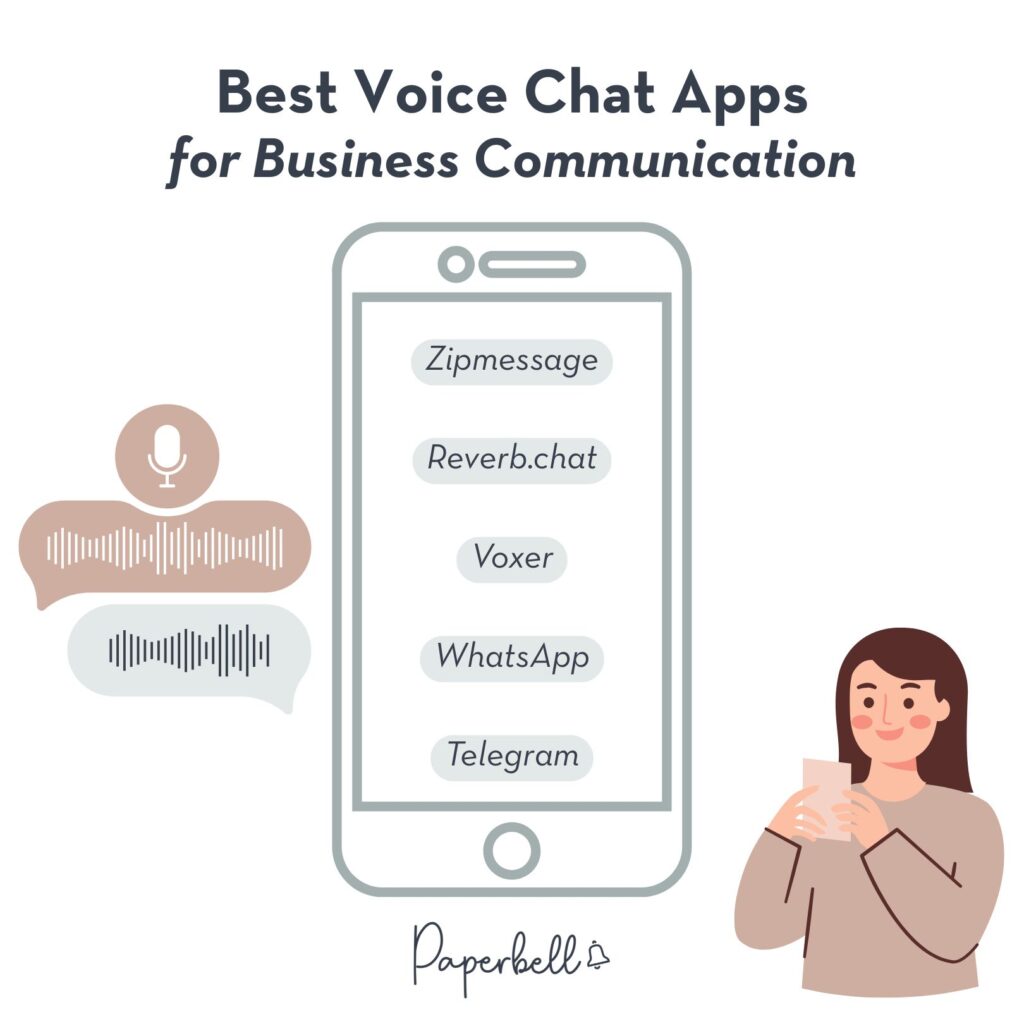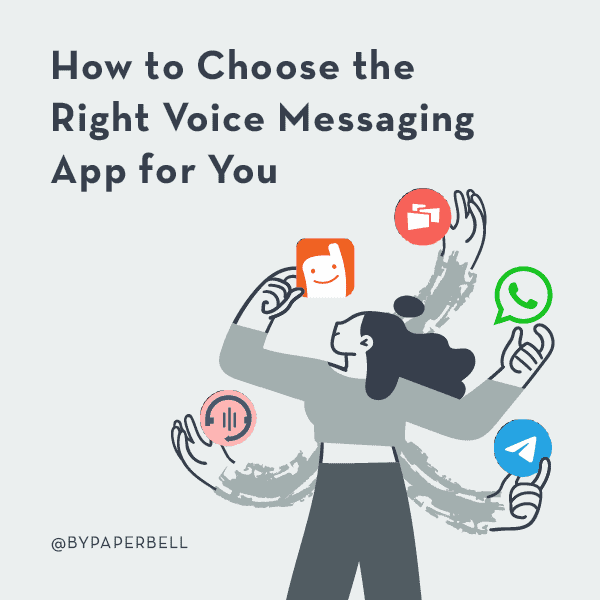Voice chat apps have become a game-changer for coaches looking to connect with clients in a more personal way. Instead of typing out lengthy emails or texts, you can simply hit record and share your thoughts naturally – just like you would in a coaching session.
Using voice messages not only saves you time but also adds incredible value to your coaching packages. Your clients get the benefit of your wisdom and support between sessions, making their coaching experience that much richer.
But which voice chat app should you choose? And how do you set healthy boundaries when offering this kind of support? In this guide, we’ll walk through everything you need to know about using voice chat apps effectively in your coaching practice.
What is a Voice Chat App?
A voice chat app is a digital tool that helps you send instant audio recordings to other people in your contact list. You can also share text messages, files, and media with the people you communicate with, which you can open either on your phone or in a browser.
Although some of these apps enable video and audio calls as well, they aren’t really meant to replace but rather complement virtual meeting platforms in your client communication.
[ Read: 6 Virtual Meeting Platforms to Use for Your Coaching Sessions (and Our Top Pick)]
What is Voice Chat Software Used for?
Consultants use voice chat apps to speed up the communication loop with their clients and teams. Since these voice messages aren’t real-time, they can be more efficient than scheduling when you work in different time zones or simply have a lot on your plate. They reduce the number of face-to-face meetings required to solve a case and can improve the ideation process.
It might be tricky to decide whether you need to schedule a meeting or just exchange voice notes in a particular situation. Here’s what voice chat apps are and aren’t used for.
What voice notes are for:
- Quick clarification about a question you discussed already with your client
- Giving quick feedback on their progress and the steps they’ve taken based on your direction
- Removing any obstacles in their way so that they can move forward (such as accessing files)
- Keeping them accountable in between sessions and after your course or program is over
What voice notes aren’t for:
- Discussing complex topics, especially the ones that haven’t come up before in your sessions or meetings
- Giving coaching or consulting
- Anything longer than a few rounds of short messages, or anything more suitable to discuss face-to-face
💡 Pro Tip: When offering voice message support in your Paperbell packages, clearly list it as a feature with defined availability hours. This helps clients see the added value while setting healthy boundaries for you.
5 of the Best Voice Chat Apps for Business Communication

Zipmessage
Zipmessage is an asynchronous video messaging software that a lot of coaches and consultants swear by. Its dedicated conversation pages make it easy to monitor your client messages and send audio or video recordings in response. You can record for up to one minute with their free plan, or upgrade to a paid plan for unlimited recording time and additional benefits, including a branded URL and integrations.
With their flexible privacy settings, you can decide to either send your messages to individuals or share a thread of responses with multiple clients in a coaching group. Messages can be opened on any device and they sync with other apps like Slack and email so your voice notes will never get lost in the noise. There’s no software download required, clients can simply open them in their browser and listen to them with multi-speed playback.
Price: Plan starts at $29 per month.
Reverb.chat
Reverb.chat is a voice and video portal that’s designed to make online courses more effective by connecting you with your students. You can set up classes or groups for your clients or message them individually with instant video and audio recordings. Reverb.chat doesn’t require any registration or verification so all you need to do is send a link to your clients and they can listen to your messages on both mobile and desktop.
It’s a great app for giving instant feedback on the action steps your clients take and report back on in an individual or group coaching program. You can also combine your online course with Reverb.chat so that you can keep your students accountable and guide them while they implement what they learn. Reverb.chat is currently invite-only: you can request to join the platform through their website.
Price: Not listed.
Voxer
Voxer is known as a digital walkie-talkie that you can use to send voice and text messages to your contacts. It’s a popular choice among coaches who sell combined packages that include training, coaching sessions, and voice chat support for a set period of time. Voxer is easy to set up and it’s free to use on both mobile and desktop with up to 500 people in a group. If you use a different messaging app to communicate with friends and family, Voxer is also a great way to separate business messages from personal ones and only get the notifications you prefer.
Price: They have a freemium plan without AI. Pro plan starts at $2.50 per user per month.
[ Read: How to Use Voxer to Scale Your Coaching Business ]
Whatsapp is one of the most popular messaging apps worldwide with over 2 billion users. Hence one of its biggest advantages is that your clients most likely use it already and they don’t have to download another app to reach you. Though WhatsApp started out as an app for personal messaging, many top businesses use it today for their work-related communication or even to set up their customer support page through WhatsApp For Business.
WhatsApp is reliable and stable even with a poor internet connection and enables fast downloads of voice notes, files, media, and texts. It’s extremely simple to use and it’s free. For coaches managing multiple client conversations, WhatsApp’s official partners like WANotifier can help you stay on top of important messages by providing various automation features through API, ensuring you never miss critical client communications. The only downside of WhatsApp is that you need to use a QR code to open your messages on desktop which might be inconvenient for some but in general, it’s one of the best apps for exchanging audio messages.
Price: Free
Telegram
Telegram is another fast and secure messaging app that you can use to share voice notes, texts, and even documents and media with a large file size without any downloading issues. It’s free and it works on all devices; you can connect it to your browser using either your phone number or a QR code.
Price: Free
How to Choose the Right Voice Messaging App for You

The right voice chat app depends on your specific coaching needs. Follow these steps to find the perfect voice chat app for your coaching business:
- Verify message length limits: Choose an app without strict time limits on voice recordings, unlike platforms such as Facebook Messenger.
- Check accessibility: Choose an app that works well even with a poor internet connection and is easy to use on both mobile and desktop.
- Consider ease of setup: Your clients should be able to access and learn the platform in under a minute. Complicated setups create friction.
- Evaluate file sharing needs: If you regularly share documents or resources, select an app that makes file transfers simple.
- Decide on video capability: Some apps let you record and send videos alongside voice messages. Determine if this feature matters to your coaching style.
FAQs
What’s the best voice chat app for new coaches?
Voxer is often the top choice for new coaches because it’s specifically designed for professional communication. It offers features like transcription, message organization, and the ability to speed up playback – all helpful when managing multiple clients.
How do I set boundaries with voice chat apps?
Start by clearly defining your availability in your coaching contract. For example, you might offer voice support Monday through Friday, 9 AM to 5 PM, with a 24-hour response time. Let clients know that urgent matters should still go through your regular communication channels.
Should I charge extra for voice chat support?
Yes, voice chat support adds significant value to your coaching packages and requires your time and attention. Consider it a premium add-on or include it in your higher-tier packages. Many coaches find it justifies a 20-30% price increase.
How long should my voice messages be?
Keep your voice messages between 30 seconds to 2 minutes for the best client experience. Longer messages can feel overwhelming, while shorter ones might not provide enough value. If you need more time, consider breaking your response into multiple messages.
Can voice chat apps replace regular coaching sessions?
No, voice chat apps should complement, not replace, your regular coaching sessions. They’re perfect for quick check-ins, accountability, and support between sessions, but deep coaching work still requires dedicated time and your full attention during scheduled calls.
Wrapping Up
Voice chat apps can be a powerful addition to your coaching toolkit when used thoughtfully. They let you provide timely support between sessions, helping your clients stay on track while building a deeper connection than text messages alone.
The key is finding the right app for your needs and setting clear boundaries from the start. Whether you choose Voxer for its coaching-friendly features or Marco Polo for its video capabilities, remember that consistency matters more than perfection.
When you’re ready to streamline the rest of your coaching business, Paperbell has you covered. Our all-in-one platform handles scheduling, payments, contracts, and client management – so you can focus on what you do best: transforming lives. Try Paperbell free with your first client and see how much easier running your practice can be.










